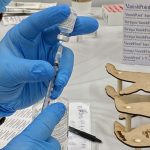Navigating Perimenopause: Your guide to a healthy transition
Perimenopause may feel like a distant concern. But preparing now can help ease this natural life transition — and your future self will thank you.
Let’s break down what perimenopause is and what to expect in the next stage: menopause.
Symptoms of Perimenopause
Perimenopause, meaning “around menopause,” begins when your ovaries start producing less estrogen. This phase can last four to eight years, typically starting in your 40s, though it can begin earlier.
During this time, the length of your menstrual cycles may change, and you might experience symptoms such as:
- Mood changes
- Heavier or lighter periods
- Hot flashes
- Night sweats
- Vaginal dryness
The Next Chapter
Menopause officially begins when you’ve gone 12 consecutive months without a period, usually between ages 40 and 58.
Many symptoms of perimenopause can continue during menopause, as your body adjusts to lower estrogen levels.
Checklist: Preparing for Perimenopause
Perimenopause may feel far off, but taking steps now can support your physical and mental health as you approach this transition. Use this checklist to start prioritizing your well-being.
- Nourish Your Body: Incorporate more plant-based foods like fruits, vegetables, and whole grains into your diet. Include protein and calcium-rich foods to help maintain muscle mass and strengthen bones.
- Build Strength: Muscle loss naturally begins during perimenopause, increasing the risk for osteoporosis. Add strength training exercises to your fitness routine to help protect your bones and maintain muscle.
- Prioritize Sleep: Lack of sleep can impact your mood and ability to manage stress. Set yourself up for better rest by avoiding screens an hour before bed and creating a cool, dark, and quiet sleep environment.
- Seek Support When Needed: If you’re struggling emotionally or physically, reach out to your OB/GYN. They can connect you with mental health resources, prescribe medications for mood changes, or discuss hormone therapy options to ease symptoms.
It’s never too soon to start habits that will support your health when you reach perimenopause.
Dr. Megan Jewell is a board-certified OB/GYN and Menopause Society-Certified Practitioner with Barton Obstetrics & Gynecology. The team at Barton OB/GYN provides gynecological, obstetrical, and family planning services in South Lake Tahoe and Minden. For more information, call 530.543.5711 or visit BartonHealth.org. And join Dr. Jewell for a free webinar, “Insights into Midlife Hormonal Health for Women,” on Thursday, October 23 from 5:00 – 6:00 p.m.; details at BartonHealth.org/Lecture.

Support Local Journalism

Support Local Journalism
Readers around the Lake Tahoe Basin and beyond make the Tahoe Tribune's work possible. Your financial contribution supports our efforts to deliver quality, locally relevant journalism.
Now more than ever, your support is critical to help us keep our community informed about the evolving coronavirus pandemic and the impact it is having locally. Every contribution, however large or small, will make a difference.
Your donation will help us continue to cover COVID-19 and our other vital local news.










